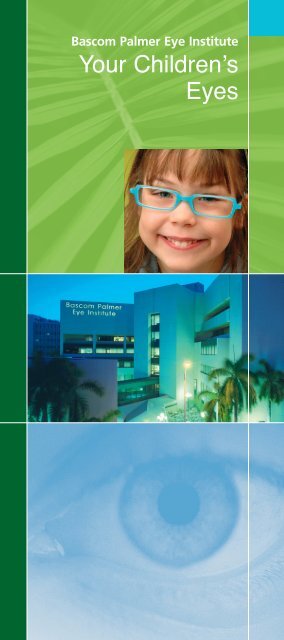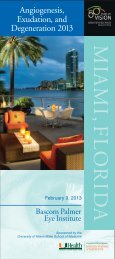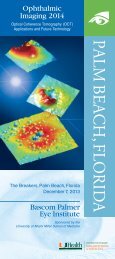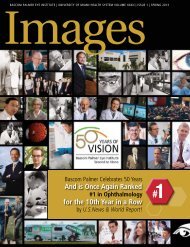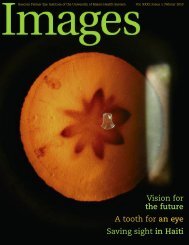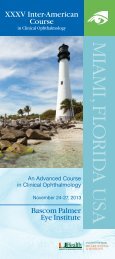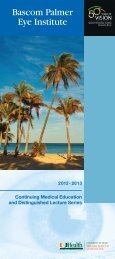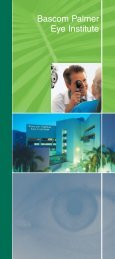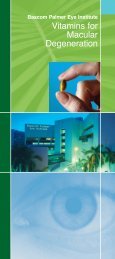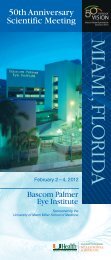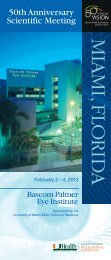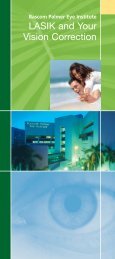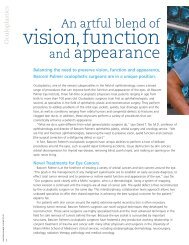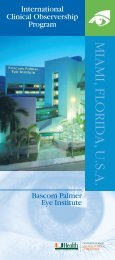Your Children's Eyes - Bascom Palmer Eye Institute
Your Children's Eyes - Bascom Palmer Eye Institute
Your Children's Eyes - Bascom Palmer Eye Institute
Create successful ePaper yourself
Turn your PDF publications into a flip-book with our unique Google optimized e-Paper software.
<strong>Bascom</strong> <strong>Palmer</strong> <strong>Eye</strong> <strong>Institute</strong><br />
<strong>Your</strong> Children’s<br />
<strong><strong>Eye</strong>s</strong>
Pediatric<br />
Ophthalmologists<br />
When should my child<br />
have his first exam<br />
Vision plays an important role in childhood<br />
development. At <strong>Bascom</strong> <strong>Palmer</strong> <strong>Eye</strong><br />
<strong>Institute</strong>, our pediatric ophthalmologists<br />
diagnose and treat more than 7,000 children<br />
annually with all childhood eye diseases and<br />
disorders, while conducting research to<br />
advance knowledge about pediatric<br />
ophthalmology. Specialized experience,<br />
diagnostic capabilities and truly talented staff<br />
give children treated at <strong>Bascom</strong> <strong>Palmer</strong> a<br />
tremendous advantage.<br />
<strong>Bascom</strong> <strong>Palmer</strong><br />
<strong>Eye</strong> <strong>Institute</strong> of the<br />
University of Miami<br />
Miller School of<br />
Medicine is ranked<br />
#1 in ophthalmology<br />
by U.S. News &<br />
World Report.<br />
<strong>Your</strong> pediatrician should examine your<br />
child’s eyes during the first year of life. If<br />
you or your pediatrician suspects any<br />
abnormality or if there is a family history of<br />
eye disease, the child should see an<br />
ophthalmologist.<br />
All children should have a comprehensive<br />
eye exam by their 4th birthday if vision<br />
appears to be developing normally, and<br />
every two years thereafter.<br />
Early diagnosis and treatment of childhood<br />
eye disease may mean better visual results.
<strong>Eye</strong> Problems<br />
Amblyopia “lazy eye” is a condition in<br />
which the visual function of one eye is<br />
underdeveloped while vision for the other<br />
eye is normal. With amblyopia, the earlier it<br />
is detected and treated the better the<br />
results have proven to be.<br />
Retinopathy of Prematurity (ROP) is the<br />
leading cause of childhood blindness in<br />
developed countries. Premature or low birth<br />
weight babies often need to receive oxygen<br />
until their immature lungs develop. Infants<br />
must be exposed to the proper levels of<br />
oxygen so that their retinas are not<br />
damaged.<br />
Strabismus “misaligned eyes”,<br />
commonly called “crossed-eyes”, is a visual<br />
defect in which the eyes are misaligned and<br />
point in different directions.<br />
Pediatric Glaucoma is treated differently<br />
from adult glaucoma. Most young patients<br />
require surgery and are referred to<br />
specialists for treatment.<br />
Ptosis is a condition in which the upper<br />
eyelid droops. Whether the lid droops<br />
slightly or cover the pupil entirely it can<br />
affect normal vision.<br />
Retinoblastoma is a rare form of cancer<br />
affecting the light-sensitive retinal cells that<br />
enable sight. Although it is very rare, it is the<br />
most common ocular malignancy in children<br />
and third most common cancer to affect<br />
children-occurring in one out of every<br />
15,000 births.<br />
When looking at<br />
a photograph of<br />
a child, “red-eye”<br />
is good. If the<br />
child’s eye appears to have white centers in<br />
flash photos, request a pediatric ophthalmic<br />
examination immediately.
<strong>Eye</strong>glasses for Infants<br />
and Children<br />
To Schedule<br />
An Appointment<br />
If eyeglasses are needed to improve your<br />
child’s vision your optometrist or<br />
ophthalmologist will write a prescription for<br />
your child specifying the lens power. This<br />
prescription is taken to an optical shop where<br />
you will select a frame with your optician that<br />
best suits your child’s needs.<br />
<strong>Eye</strong> Safety for Children<br />
Have children wear protective eyewear<br />
during sports or other hazardous activities.<br />
To schedule an appointment with a<br />
<strong>Bascom</strong> <strong>Palmer</strong> ophthalmologist,<br />
please call 1-888-845-0002.<br />
Appointments may also be requested<br />
online at: www.bascompalmer.org<br />
<strong>Bascom</strong> <strong>Palmer</strong> <strong>Eye</strong> <strong>Institute</strong>’s<br />
Emergency Department in Miami is<br />
open 24 hours a day, 365 days a year.<br />
Always supervise children when they are<br />
using pencils, scissors, forks and knives.<br />
Even common household items such as<br />
paper clips, rubber bands, or wire hangers<br />
can cause serious eye injury.<br />
Childproof your home and keep all<br />
chemicals, sprays, and household cleaners<br />
out of reach of small children.<br />
Select games and toys that are age<br />
appropriate.<br />
<strong>Bascom</strong> <strong>Palmer</strong> <strong>Eye</strong> <strong>Institute</strong> of<br />
the University of Miami Miller<br />
School of Medicine is proud to be<br />
America’s best eye hospital<br />
according to U.S. News & World<br />
Report.
<strong>Bascom</strong> <strong>Palmer</strong> <strong>Eye</strong> <strong>Institute</strong><br />
(800) 329-7000<br />
www.bascompalmer.org<br />
Miami<br />
900 N.W. 17 Street, Miami, FL 33136<br />
(305) 326-6000<br />
Palm Beach Gardens<br />
7101 Fairway Drive, Palm Beach Gardens, FL 33418<br />
(561) 515-1500<br />
Naples<br />
311 Ninth Street North, Naples, FL 34102<br />
(239) 659-3937<br />
Plantation<br />
1000 South Pine Island Road, Plantation, FL 33324<br />
(954) 465-2700<br />
06/10


